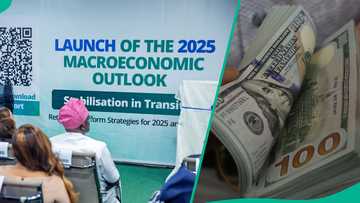Nigerian Manufacturers Lament N1.4 Trillion Unsold Goods in December 2024
- Nigerian manufacturers have come out to say that they had over N1.4 trillion worth of unsold goods by the end of the year
- The MAN president said that energy costs now account for their highest operating expenses despite the epileptic power supply
- They called on the federal government to help save the local manufacturing sector by addressing the challenges
Legit.ng journalist Ruth Okwumbu-Imafidon has over a decade of experience in business reporting across digital and mainstream media.
Nigerian manufacturers have expressed concern over the deteriorating macroeconomic conditions and the growing inflationary pressures in Nigeria, which led to an unsold inventory worth N1.4 trillion by December 2024.
The president of the Manufacturers Association of Nigeria, Francis Meshioye, noted that the situation worsened from the N1.24 trillion unsold inventory by the end of June 2024, rising by 13% to N1.4 trillion.
He noted that the manufacturing sector is the worst hit by the current economic headwinds, and its growth has been severely impacted by economic challenges and other infrastructural issues that the Nigerian business environment presents.

Source: Getty Images
Specifically, he decried the alarming rise in the inflation rate that continues to deplete Nigerians’ disposable income and demand for goods, the Guardian reports.
Nigeria’s inflation hit 34.6% in November 2024, and the recent statistics from the National Bureau of Statistics show that it surged further in December 2024 to 34.8%.
In the face of such inflation, Meshioye pointed out that demand for manufactured goods have continued to decline.
He said;
“This also led to an accumulation of unsold inventory across industries. Naira fell from ₦666/$ in mid-2023 to over ₦1700/$ by mid-2024. This depreciation inflated the costs of imported raw materials and machinery, worsening the already strained profitability of manufacturers.”
High interest rates choke businesses
He also complained about the interest rates raised by the Central Bank of Nigeria (CBN) monetary policy committee (MPC). With interest rates reaching 27.75% in November 2024, the cost of accessing funds increased significantly, making it nearly impossible for businesses to attempt any capital-intensive expansion.
Meshioye stressed that this has largely stifled growth in the sector and barricaded long-term growth opportunities, as manufacturers now refrain from taking bank loans.
If the situation is not addressed, Meshioye warned that Nigeria will continue to support the growth of manufacturing companies in other countries through increased imports, which will kill the local economy.
Outrageous electricity bills amid epileptic supply
The MAN president explained further that the sharp rise in electricity tariffs by over 250% was a core challenge for the sector.
Most manufacturing businesses require power to run their operations, and he noted that despite paying these outrageous bills, they are still forced to resort to alternative energy sources due to the unreliable and epileptic power supply from DisCos.
Thus, energy costs end up being the highest bills for manufacturers to pay due to the rising prices of alternatives like fuel and gas.
He said;
“As a result, many manufacturers sought alternative energy sources, further straining their financial resources and complicating their ability to remain competitive.”
Lending his voice to the matter, the Director-General of MAN, Mr. Segun Ajayi-Kadir, stated that the DisCos are simply ripping off manufacturers without providing commensurate services.
He queried;
“Where in the world is business done the way, our DisCos are doing? If you are in a private business and it is not working out, leave it alone. Many businesses have collapsed, others have left the country, many are underperforming because of the economic challenges; others are taking their losses quietly. If the Discos say they are not profitable, they should cut their losses and go and do something else.”
Manufacturers shun loans due to high interest rates
In related news, Legit.ng reported that Nigerian manufacturers were ignoring loans from commercial banks due to the outrageous interest rates.
Data from a CBN report showed that for the first time in two years, credit to the manufacturing sector declined quarterly in 2024, falling by 6.67% quarter-on-quarter (QoQ) from N9.29 trillion to N8.67 trillion in the third quarter of 2024 (Q3’24).
Stakeholders in the manufacturing sector called on the federal government to prevail on the Central Bank of Nigeria, to adopt a more business-friendly approach to its monetary policies.
PAY ATTENTION: Сheck out news that is picked exactly for YOU ➡️ find the “Recommended for you” block on the home page and enjoy!
Source: Legit.ng






